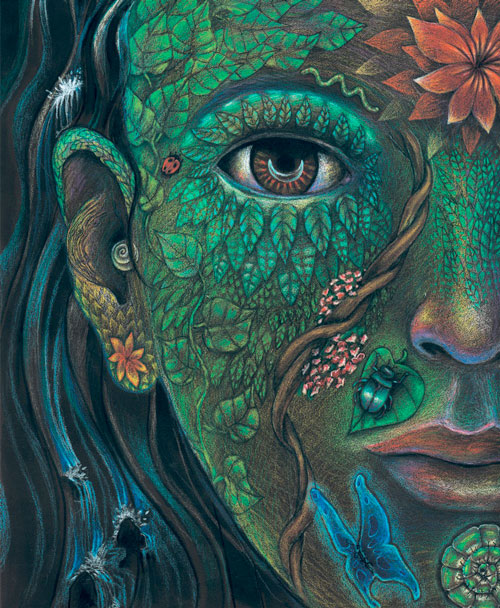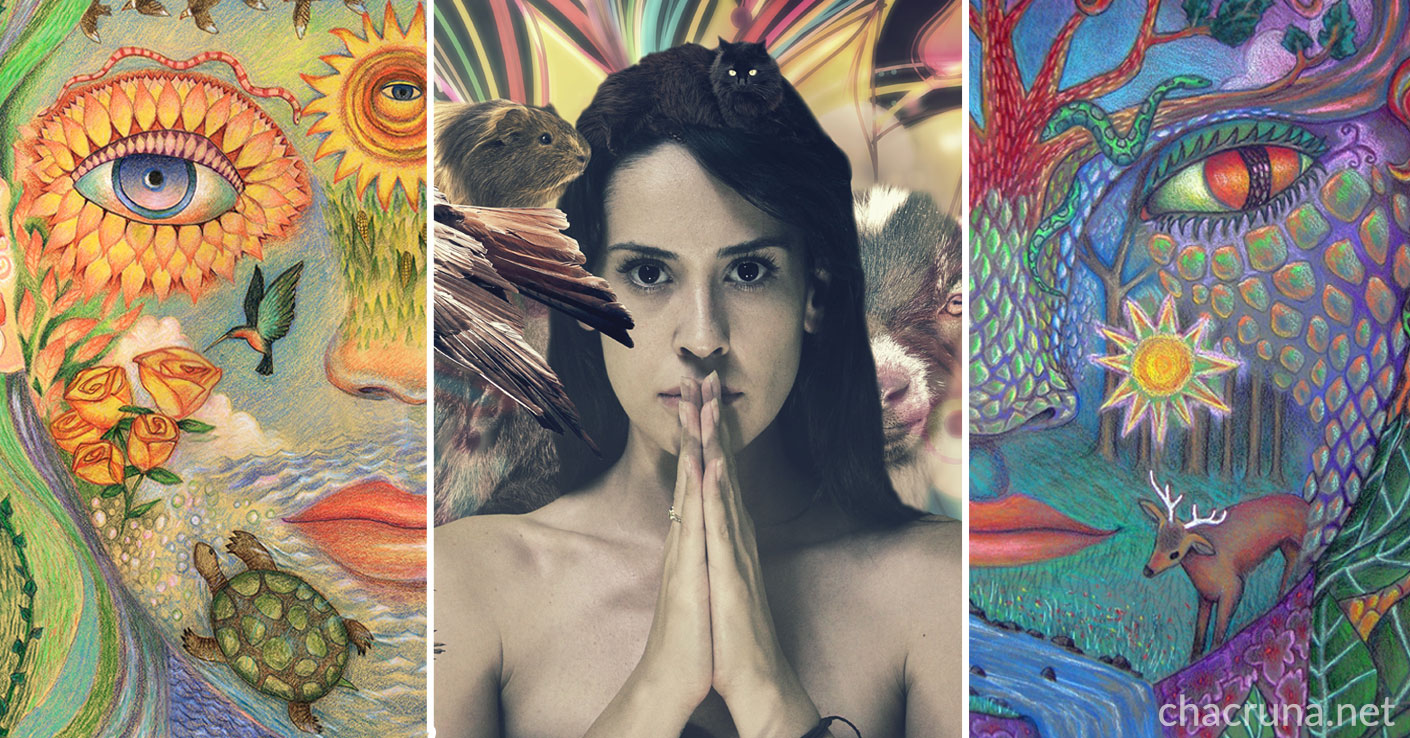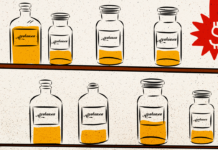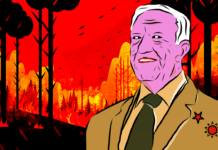- Queering Psychedelics: An Introduction - August 7, 2024
- Introduction to Women and Psychedelics - July 26, 2024
- Eight Frequently Asked Questions About Ayahuasca Globalization - February 13, 2024
Ayahuasca is a medicine that has the power, in some people, to heal trauma, to inspire insight, and to change habits. The mechanism for these powers is unknown, but some fundamental observations can be made. I have been drinking ayahuasca for 19 years and have also undertaken formal research into the psychological terrain of ayahuasca’s effects upon individuals and society. In what follows, I share what I believe are the most significant effects that ayahuasca can have upon the ego.
Firstly, it’s important to acknowledge that there are many kinds of ayahuasca. A popular idea currently is to emphasize the safety of the mix of just two ingredients: the vine and the admixture leaf, either chacruna (Psychotria viridis) or chaliponga (Diplopterys cabrerana, used more frequently in Colombian ayahuasca, which is also known there as “yage”). Also, it should be remembered that ayahuasca’s effects are different for each drinker, and though many may praise its effects on their lives, for some, the experience is just a kinesthetic event, with no visual component, but leaving a lasting feeling of satisfaction; for other people a full-blown visionary state is experienced, with spirit creatures giving advice and even performing energetic operations on the bodies of the drinker. Some will not have a rewarding experience at all.
The visions and understandings that come from ayahuasca are influenced by the setting and expectations (the set) of the drinker, but they can often seem unexpected and even unwelcome, as in the case of “examining the conscience” and recognizing the harms one may have done, or time wasted in selfish or vain pursuits. Setting an intention before the ritual can help guide interpretations of the visions, but may reveal unsettling information that the drinker did not expect.
The ability of ayahuasca to treat depression and drug addiction is a topic that has been explored in research studies that point to a high rate of success compared to standard treatment for these disorders.1 2 3 4 5 What special power does ayahuasca have that contributes to these successes? One theory is that these conditions are a result of a malfunction of the ego; anger is famously the flipside of depression, and anger is typically a protective response of the ego to fear of assault. Defenses rise and the person is cut off from the experience of the world, from social engagement, and from their own pleasure.
“The teachings of ayahuasca are exquisitely tailored to the life and understanding of each drinker, which can result in the common report of experiencing years of therapy in a single night of drinking ayahuasca.”
What, then, is being assaulted, when we speak of the ego? It is the perceived identity, in whatever stage of therapeutic or spiritual evolution it has acquired in its journey. The ego is the actor, and shifts in its role during an ayahuasca session can be seismic. Ayahuasca has the power to re-orient identity, helping people “remember” their mission in life and showing them the power they have to overcome obstacles to create the lives they imagine could be possible. In my research on gay ayahuasca users,6 where I asked questions directly about identities, several said they had discovered their calling as healers or that they had a mission on Earth, often connected to ayahuasca. I have observed this phenomenon also in other circumstances since then. In fact, I am also a person for whom this is true, and I devote a considerable amount of my free time promoting the responsible use of ayahuasca, as I feel indebted to the drink for all it has shown me in my own life, and protective of it reputation. Besides the commitment to the drink itself, new understanding of nature and interdependency arise as the boundaries of the ego shift to include more elements of the ecosystem on which it depends.
Ayahuasca’s effect on interpersonal relationships is also notable. Poor interpersonal relationships often characterize drug addicts and depressed people; in particular, a tendency to isolate and withdraw into a cushion of endorphins or the darkness of despair, respectively. Working again on the boundaries of the ego, feelings of gratitude for others in one’s life, feelings of love and connection, and experiences of compassion for the human race and increasing solidarity with them, are often reported in ayahuasca accounts. The patterns of interdependency become apparent in various ways to the ayahuasca drinker, and connections of all kinds are observable.
In many cases, these insights have the power to affect the real-life relationships of drinkers, having the positive effect of enhancing interpersonal connection and honesty, resulting in greater feelings of support and care. In my research, participants noted they also tended to allow toxic relationships to wither, creating a safe environment for healthy personal relationships based on trust and compassion, to flourish. Shifts in identity are powerful agents of change. The shift in self-conception from “victim” to “victor” can be a decisive factor in the journey of life. Ayahuasca shows drinkers deeper levels of awareness and, using that knowledge, people can alter their perceptions of themselves, resulting in a change in their identity. Who we are before we drink is never who we are after: this is something more or less believed by many ayahuasca aficionados.

– Artwork “Plant Life” by Clancy Cavnar
Psychotherapy and psychedelics both assist in helping redefine identity. Psychotherapy focuses on ego defenses and issues stemming from identification with the ego and its journey to wholeness, while ayahuasca can loosen the strict boundaries of self-perception and allow other information and perspectives in, introducing a new dimension of healing. The teachings of ayahuasca are exquisitely tailored to the life and understanding of each drinker, which can result in the common report of experiencing years of therapy in a single night of drinking ayahuasca. The sides of the personality that are not acknowledged are represented in images and presented in a way that the observing ego can appreciate. Such realizations can unleash torrents of emotion that wash away blockages and limits. Physical purging by vomiting or defecating also plays a part in opening up the body and mind so the limitations can be eroded and expelled.
Ayahuasca’s use in treating trauma, explored recently by Gabor Maté,7 is one valuable use of this medicine, but beyond that, this medicine provides even well adjusted individuals with enhanced peacefulness, satisfaction with life, and spiritual nourishment. The field of Positive Psychology provides some reference for the experience of people who find their non-pathological lives enriched by the practice of drinking ayahuasca. Positive Psychology is the study of ways life can be made more rewarding and enjoyable without offering a cure for pathologies.
Qualities that have been reported as effects of ayahuasca, as seen in the literature, include assertiveness, joy of life and liveliness; less signs of anxiety, with drinkers being more optimistic, self confident, and emotionally mature. Effects of enhanced mindfulness, personal empowerment, hopefulness, improvements in quality of life, increased subjective feelings of connection with spirit, nature, self, and others; increased insight, the ability to reframe cognitive structures, enhancement of trust and social feelings; and a richer, more joyous life. Drinkers reported “letting go of negativity,” being less cynical, feeling more genuine, feeling more acceptance of themselves, increasing confidence and calmness; feelings of compassion, generosity, humility; recognizing the importance of love, feeling a responsibility to others, an emphasis on simplicity, not harboring bad thoughts about others, and gratitude. Some said ayahuasca helped them make sense out of their lives. Many people report spiritual experiences where they become aware of their true selves or witness their personal power in its limitless form.
“The hungry ego, once fed, becomes ravenous and marvels at itself. The mix of ego with psychedelic experience can have this negative outcome.”
Combining Western psychology with Eastern religious concepts, we can conceive of the action of ayahuasca on the ego as malleable, able to contract it and expand it. Contractions can consist of feelings of remorse, darker journeys where one confronts one’s failings and regrets. These are not uncommon in ayahuasca reports, but they are often recognized afterward to have been healing or illuminating.
The expansion of the ego can result in mystical states of all-inclusive awareness, love and humility, or in the unfortunate side effect that is sometimes seen in enthusiasts: the ego reinforced by witnessing its own glory, believing it has a dominant role to play in the unfolding drama, that can become full of certainty to the point of arrogance. The hungry ego, once fed, becomes ravenous and marvels at itself. The mix of ego with psychedelic experience can have this negative outcome. Further, those with psychiatric problems resulting in a fragile connection to the ego, as in psychoses, may find the results of ayahuasca to further disintegrate their ego strength, causing increased disorganization and confused boundaries.
Changes to the ego can also result in changes to identity, giving glimpses of a real self that is a beautiful light full of compassion. That light may be interpreted in a number of ways, but its underlying power is to heal the body and mind. Is that light ayahuasca, or does ayahuasca simply have the power to shine through the obscurations of the ego structures so that the ever-present inner light can do its work on the conscious mind, which is usually so bound in day-to-day discursive thought that this force is completely hidden?
– Sample from Dr. Cavnar’s Online course: Psychological Aspects of Preparing For & Integrating Ayahuasca Experiences.
Because ayahuasca is an outside agent and these mystical experiences are not the result of years of mind-calming meditation, mindfulness training, and yoga, the inner world that is illuminated can be full of unresolved trauma and difficult experience imprints that are usually kept repressed by the ego in its efforts to feel safe and in control. During the short period of the ayahuasca experience, these revelations can feel shocking, or can elicit waves of sorrow or horror. In the end, however, integrating these parts back into the awareness of the ego is healing, even if the integration may be difficult. This is why integration therapies after ayahuasca sessions can be valuable following some experiences.
Ego death, or as Jung called it, “psychic death,” is also called “ego loss.” It signifies the complete loss of subjective identity. In Jungian theory, this precedes a rebirth into a new identity. Timothy Leary coined the term “ego loss” in regard to LSD experiences. Ego death is the second stage In Joseph Campbell’s Hero’s Journey. Ego death in Buddhism is related to understanding one’s true nature, (not mistaking the rope for the snake), which leads to a permanent awakening from ego fixation (one will never mistake the rope for the snake once it is seen to be a rope).
With psychedelics, and particularly with ayahuasca, the experience of seeing one’s true self can be fleeting, and if someone is not prepared for it, shocking, with the participant, if unprepared, panicking and grasping at illusory ideas of self that offer no certainty. Stanislav Grof8 describes ego death in the context of psychedelic use, “The main objective of psychedelic therapy is to create optimal conditions for the subject to experience the ego death and the subsequent transcendence into the so-called psychedelic peak experience. It is an ecstatic state, characterized by the loss of boundaries between the subject and the objective world, with ensuing feelings of unity with other people, nature, the entire universe and God…”
Similar to the theories of Positive Psychology and Naranjo’s9 conclusions about the essential good nature of humanity that underlies all our flaws, it appears ayahuasca only reveals what is already in place; indicating a path through the structures built unconsciously to protect the ego that eventually come to block out most of the inner-generated light.
This article is the first in a series on the psychology of ayahuasca. Click here to read the second piece: Cultivating the Mind, Body & Spirit with Ayahuasca
References
- Mitchell B. Liester and James I. Prickett, “Hypotheses Regarding the Mechanisms of Ayahuasca in the Treatment of Addictions,” Journal of Psychoactive Drugs 44, no. 3 (2012): 200–208 ↩
- Fernanda Palhano-Fontes, Joao C. Alchieri, Joao Paolo M. Oliveira, Bruno Lobao Soares, Jaime E. C. Hallak, Nicole Galvao-Coelho and Draulio B. de Araujo. (2014). “The therapeutic potentials of ayahuasca in the treatment of depression,” in The Therapeutic Use of Ayahuasca, eds. Beatriz C. Labate and C. Cavnar (New York City, NY: Springer, 2014) 23–39 ↩
- Anya Loizaga-Velder, A. and Armando Loizaga, (2014) “The Therapeutic Value of Ayahuasca for Addiction Treatment from Psychotherapeutic Perspective,” in The Therapeutic use of ayahuasca, eds. Beatriz C. Labate and Clancy Cavnar (New York City, NY: Springer, 2014) 133–152 ↩
- Gerald Thomas, Pierre Lucas, N. Riell Capler, Kenneth W. Tupper, and Gina Martin, “Ayahuasca-Assisted Therapy for Addictions: Results From a Preliminary Observational Study in Canada,” Current Drug Abuse Reviews 6 (2013): 30–42 ↩
- Michael Winkelman, “Psychedelics as Medicines for Substance Abuse Rehabilitation: Evaluating Treatments with LSD, Peyote, Ibogaine and Ayahuasca,” Current Drug Abuse Review 7 (2014): 101–116 ↩
- Clancy Cavnar, C. (2011). The Experiences of Gay and Lesbian People Using Ayahuasca (PhD diss., John F. Kennedy University, Pleasant Hill, CA) ↩
- Gabor Maté, “Deep Ayahuasca Healing and The Truth of Who You Are,” Chacruna.net (2017), retrieved from https://chacruna.net/deep-ayahuasca-healing-truth-who-you-are/ ↩
- Stanislav Grof, History of LSD Therapy (Alameda, CA: Hunter House, 1994), retrieved from http://www.psychedelic-library.org/grofhist.htm ↩
- Claudio Naranjo, “On the Moral Problem of Psychedelics and the Mental Health Problem of Morality,” Chacruna.net (2017), retrieved from https://chacruna.net/moral-problem-psychedelics-mental-health/ ↩
Take a minute to browse our stock:
Did you enjoy reading this article?
Please support Chacruna's work by donating to us. We are an independent organization and we offer free education and advocacy for psychedelic plant medicines. We are a team of dedicated volunteers!
Can you help Chacruna advance cultural understanding around these substances?














